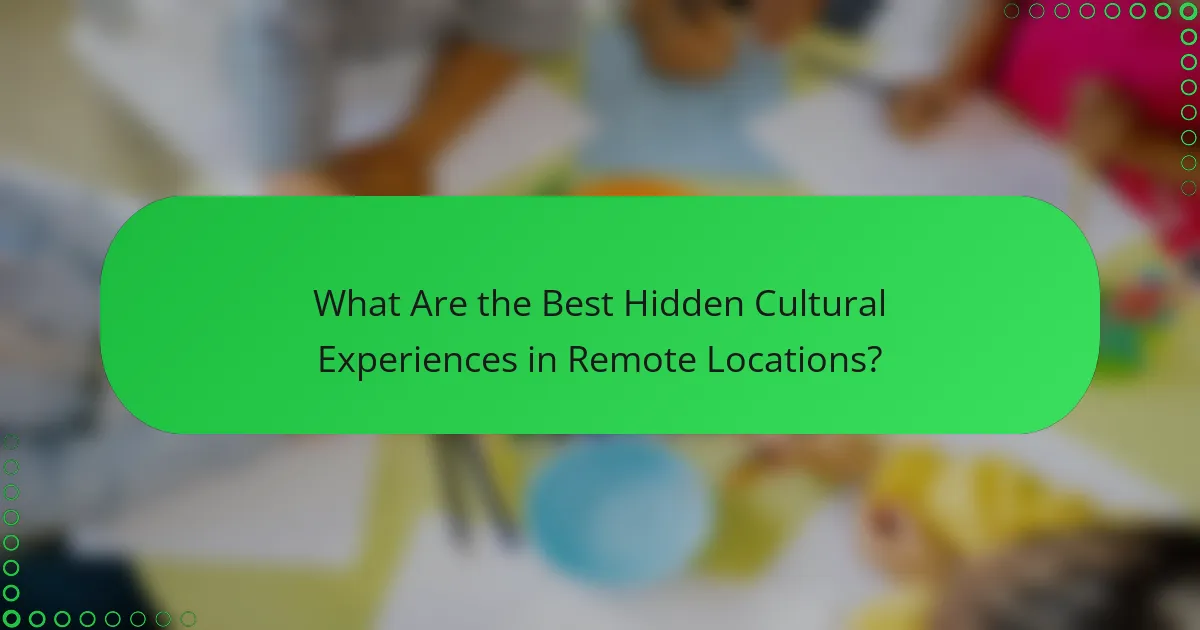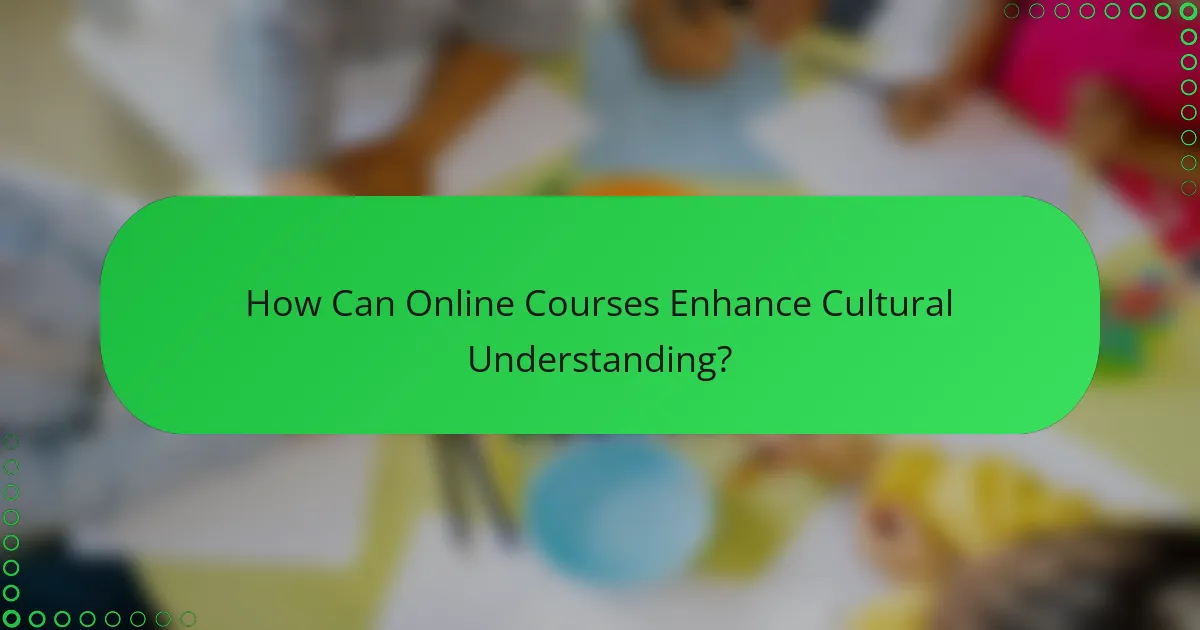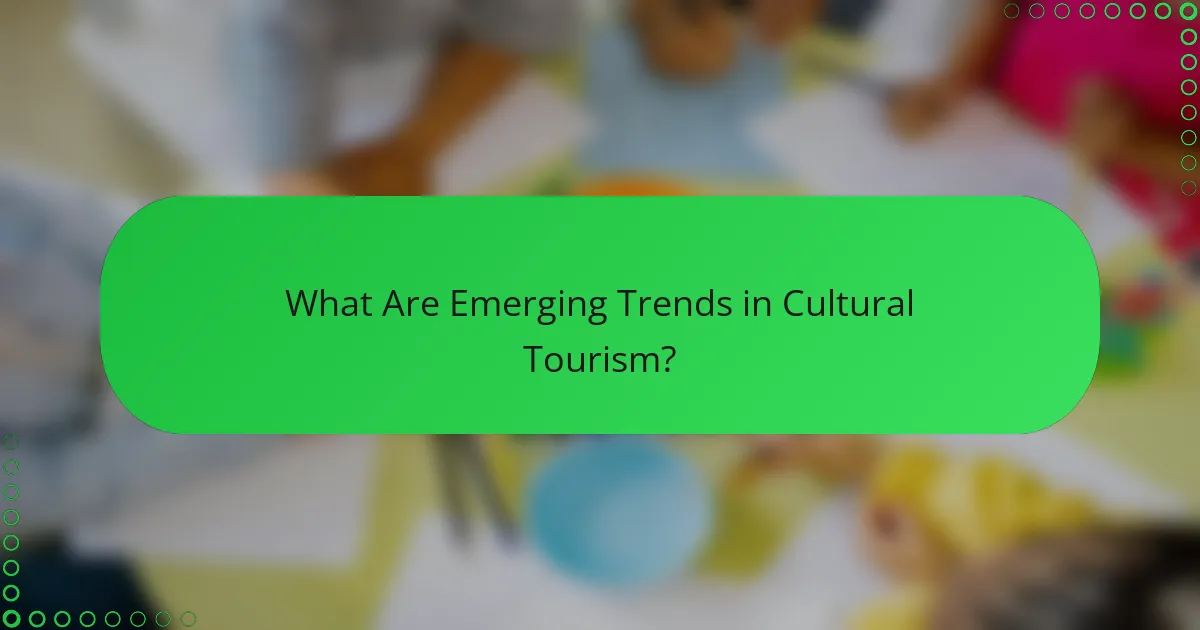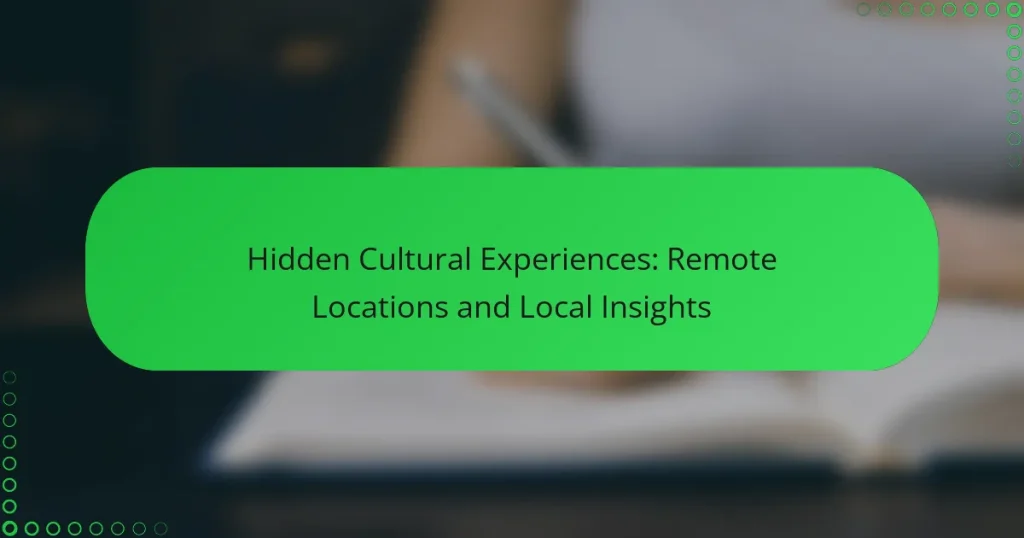Discovering hidden cultural experiences in remote locations can unveil the rich tapestry of local traditions and lifestyles. By engaging with indigenous communities, travelers gain invaluable insights into their heritage, fostering a deeper appreciation for diverse ways of life. Prioritizing authenticity and community involvement enhances these experiences, ensuring meaningful connections and mutual enrichment.

What Are the Best Hidden Cultural Experiences in Remote Locations?
The best hidden cultural experiences in remote locations offer unique insights into local traditions, lifestyles, and histories. Engaging with indigenous communities and exploring their customs can provide a deeper understanding of their heritage and way of life.
Experiencing the Sami Culture in Norway
The Sami people, indigenous to northern Norway, offer rich cultural experiences that include traditional reindeer herding, handicrafts, and music. Visitors can participate in activities such as reindeer sledding and learn about the Sami’s connection to nature and their unique language.
To fully appreciate Sami culture, consider visiting during the winter months when festivals like the Sami National Day are celebrated. Engaging with local Sami guides can enhance your experience, providing authentic insights into their traditions and daily life.
Exploring the Indigenous Communities in the Amazon
The Amazon rainforest is home to numerous indigenous communities, each with distinct cultures and practices. Visiting these communities allows for immersive experiences, such as learning about traditional medicine, crafts, and sustainable living practices that have been passed down for generations.
Travelers should approach these visits with respect and sensitivity, ensuring that interactions are consensual and beneficial to the community. Consider guided tours that prioritize ethical engagement and support local economies, which can enhance both your experience and the community’s well-being.
Discovering the Berber Traditions in Morocco
The Berber people, known for their rich history and vibrant culture, inhabit the mountainous regions of Morocco. Engaging with Berber communities can involve exploring their traditional crafts, music, and cuisine, as well as staying in local guesthouses to experience their hospitality firsthand.
To delve deeper into Berber culture, consider participating in local festivals or workshops that showcase their art and music. Be mindful of cultural norms and practices, and aim to support local artisans by purchasing handmade goods rather than mass-produced items.

How Can Online Courses Enhance Cultural Understanding?
Online courses can significantly enhance cultural understanding by providing immersive learning experiences that connect learners with diverse perspectives. These courses often include interactive elements and expert insights, making it easier to grasp complex cultural nuances.
Interactive Learning Modules
Interactive learning modules engage participants through quizzes, discussions, and multimedia content, fostering a deeper connection to the material. For example, a module on Japanese tea ceremonies might include video demonstrations, allowing learners to visualize and appreciate the cultural significance behind each step.
When selecting interactive courses, look for those that offer real-time feedback and opportunities for peer interaction. This can enhance understanding and retention, as learners can share insights and ask questions in a supportive environment.
Expert-Led Virtual Tours
Expert-led virtual tours provide firsthand insights into different cultures, often featuring local guides who share their knowledge and experiences. These tours can range from exploring historical sites in Greece to navigating bustling markets in Morocco, allowing participants to experience cultural contexts that textbooks cannot convey.
To maximize the benefits of virtual tours, choose those that include Q&A sessions with the guide. This interaction allows learners to delve deeper into specific topics and gain a more nuanced understanding of the culture being explored.

What Criteria Should You Consider When Choosing Cultural Experiences?
When selecting cultural experiences, consider authenticity, local community involvement, and accessibility. These factors ensure that your engagement is genuine and enriches both your understanding and the local culture.
Authenticity of the Experience
Authenticity refers to the genuine representation of a culture, tradition, or practice. Look for experiences that are not overly commercialized or staged, as these can dilute the true essence of the culture.
To assess authenticity, seek out local guides or organizations that prioritize cultural preservation. For example, participating in a traditional cooking class led by a local family can provide a more authentic experience than a tourist-oriented cooking school.
Local Community Involvement
Local community involvement is crucial for ensuring that cultural experiences benefit the residents. Choose experiences that support local artisans, performers, and businesses, which helps sustain the community economically and socially.
Engage with experiences that are organized by local groups or cooperatives. For instance, attending a craft workshop hosted by local artisans not only provides insight into their skills but also directly supports their livelihoods.

How Do Remote Locations Impact Cultural Insights?
Remote locations significantly influence cultural insights by fostering unique traditions and local knowledge that may not be present in urban areas. The isolation of these areas often leads to the preservation of customs and practices that reflect the community’s history and environment.
Isolation and Preservation of Traditions
Isolation plays a crucial role in preserving cultural traditions. In remote areas, communities are less exposed to external influences, allowing them to maintain their unique practices, languages, and rituals. For instance, the indigenous tribes in the Amazon rainforest continue to practice their ancestral customs, which have been passed down through generations.
This preservation can lead to a rich cultural tapestry that attracts anthropologists and travelers seeking authentic experiences. However, it is essential to approach these cultures respectfully, ensuring that interactions do not disrupt their way of life.
Access to Unique Local Knowledge
Remote locations often harbor unique local knowledge that is not easily accessible elsewhere. Residents possess insights about their environment, traditional medicine, and sustainable practices that have been developed over centuries. For example, communities in the Himalayas have extensive knowledge of herbal remedies that are specific to their region.
Engaging with local experts can provide valuable lessons in sustainability and cultural practices. Travelers should prioritize learning from these communities, but they must also be mindful of not appropriating their knowledge or practices without permission.

What Are the Benefits of Engaging with Local Cultures?
Engaging with local cultures offers numerous benefits, including personal growth and the opportunity to build meaningful global connections. By immersing oneself in different cultural practices and perspectives, individuals can gain valuable insights and foster relationships that transcend geographical boundaries.
Enhanced Personal Growth
Engaging with local cultures can significantly enhance personal growth by broadening one’s worldview. Exposure to diverse traditions, languages, and lifestyles encourages adaptability and fosters empathy, helping individuals to become more open-minded and culturally aware.
To maximize personal growth, consider participating in local workshops or community events. For example, learning traditional cooking techniques or crafts can provide hands-on experience and deepen your understanding of the culture.
Building Global Connections
Building global connections through local cultural engagement can lead to lasting friendships and professional networks. By interacting with locals, travelers can gain insights into their lives, creating bonds that often extend beyond the initial encounter.
To effectively build these connections, engage in conversations, attend cultural festivals, or volunteer in community projects. Such activities not only enrich your experience but also create opportunities for collaboration and exchange, enhancing both personal and professional relationships across borders.

How to Find Authentic Cultural Experiences Online?
To find authentic cultural experiences online, focus on platforms that connect travelers with local hosts and guides. These resources often provide unique insights into local customs, traditions, and hidden gems that typical tourist activities may overlook.
Utilizing Platforms Like Airbnb Experiences
Airbnb Experiences allows travelers to book activities hosted by locals, ranging from cooking classes to guided tours of lesser-known areas. This platform emphasizes personal interaction and often features unique offerings that reflect the host’s culture and expertise.
When searching for experiences, consider reading reviews and checking the host’s profile to ensure they align with your interests. Prices can vary widely, typically starting from around $30 to $200 per person, depending on the activity and location.
Searching for Local Guides on ToursByLocals
ToursByLocals connects travelers with local guides who offer personalized tours tailored to specific interests. This platform allows you to choose guides based on their expertise, reviews, and the types of experiences they offer, ensuring a more authentic encounter with the local culture.
When using ToursByLocals, look for guides who specialize in your area of interest, whether it’s history, food, or outdoor adventures. Rates generally range from $50 to $300 for a half-day or full-day tour, depending on the guide’s experience and the complexity of the tour.

What Are Emerging Trends in Cultural Tourism?
Emerging trends in cultural tourism focus on authentic experiences that connect travelers with local communities and traditions. This shift emphasizes immersive activities in remote locations, allowing visitors to gain deeper insights into the culture and lifestyle of the places they visit.
Increased Demand for Authentic Experiences
Travelers are increasingly seeking genuine interactions with local cultures rather than typical tourist attractions. This trend encourages destinations to offer unique experiences, such as workshops with artisans, guided tours by locals, or participation in traditional festivals. These activities not only enrich the travel experience but also support local economies.
Focus on Sustainability and Responsible Tourism
There is a growing emphasis on sustainable practices within cultural tourism. Travelers are more aware of their environmental impact and prefer options that promote conservation and respect for local communities. This includes choosing eco-friendly accommodations, supporting local businesses, and participating in cultural preservation efforts.
Integration of Technology in Cultural Experiences
Technology is playing a significant role in enhancing cultural tourism. Mobile apps and virtual reality experiences allow travelers to explore destinations in innovative ways. For instance, augmented reality can provide historical context at cultural sites, while social media platforms enable travelers to share their experiences and connect with local communities.
Rise of Remote and Off-the-Beaten-Path Destinations
Many travelers are now venturing to remote locations that offer unique cultural insights away from crowded tourist hotspots. This trend not only helps to distribute tourism more evenly but also allows visitors to discover lesser-known traditions and practices. Examples include rural villages in Eastern Europe or indigenous communities in South America.


